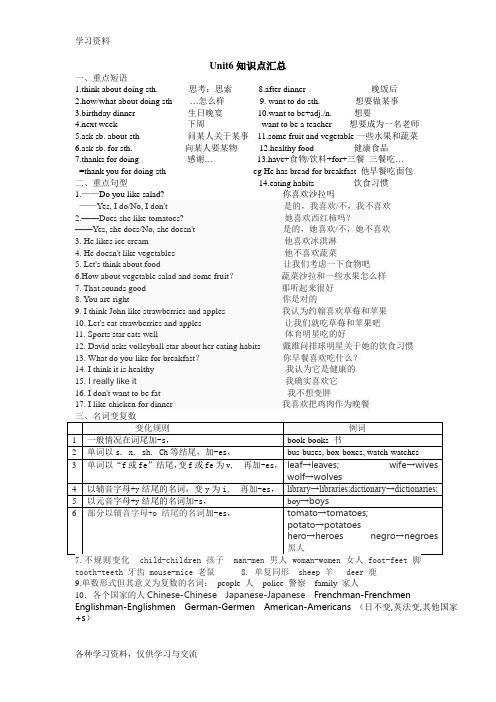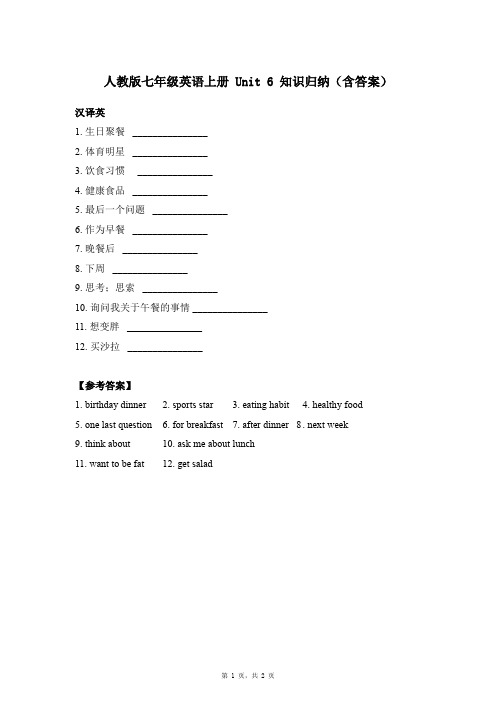人教版-七年级上册-英语知识点-全--第六单元--unit-6-知识点
- 格式:doc
- 大小:27.50 KB
- 文档页数:4

Unit 6 知识点1.tomato“西红柿”—tomatoes(复数)以o结尾,变复数加es的还有:Negro(Nergoes)黑人;hero (heroes)英雄;potato(potatoes)土豆。
k牛奶(不可数名词),没有复数名词,可借助单位词表示数量。
a glass of milktwo glasses of milk3.bread 面包, 为不可数名词。
a piece of bread一片面包; two pieces of bread两片面包4.dinner 表示一日之中较为丰富的正餐have…for breakfast/for lunch/for dinner, 表示“某餐吃什么”,要用介词for。
have breakfast吃早餐have lunch吃午餐have dinner吃晚餐注意:have后接三餐名词,名词前不加冠词,但是前有修饰词时需加冠词。
They have dinner early today.We had a big dinner at the party.5.next, last, this后跟表示时间的词构成时间状语,其前不加介词。
last week/this week/next week 上周/这周/下周6.think about“思考;考虑”,用法如下:(1)后接名词John’s birthday dinner is next week. Let’s think about the food.(2)后接代词Give me five minutes to think about it.(3)后接动词V-ing形式I’m thinking about swimming.7.vegetable“蔬菜”, 可数名词,在vegetable salad(蔬菜沙拉)中修饰名词,要用单数形式。
注意:vegetable做定语,修饰名词,要用单数形式。
What about some vegetable salad?8.right“正确的”,形容词,反义词为wrong, 意为“错误的”。



人教版七年级上册英语第六单元知识点 unit 1 can you play the guitar?◆短语归纳1. play chess 下国际象棋2. play the guitar 弹吉他3. speak english 说道英语4. english club 英语俱乐部5. talk to 跟…说道6. play the violin 拉小提琴7. play the piano 弹钢琴8. play the drums 敲鼓9. make friends 广交朋友10. do kung fu 练 (中国) 功夫11. tell stories 讲故事12. play games 做游戏13. on the weekend/on weekends 在周末◆用法集萃1. play +棋类/球类下……棋,踢……球2. play the +西洋乐器弹/拉……乐器3. be good at doing sth.= do well in doing sth. 擅于搞某事4. be good with sb. 和某人相处地好5. need sb. to do sth. 须要某人搞某事6. can + 动词原形能/会做某事7. a little + 不可数名词一点儿……8. join the …club 加入…俱乐部9. like to do sth. =love to do sth. 讨厌/钟爱搞某事◆典句必背1. ca n you draw? yes, i can. / no, i can’t.2. what club do you want to join? i want to join the chess club.3. you can join the english club.4. sounds good./that sounds good.5. i can speak english and i can also play soccer.6. please call mrs. miller at -.unit 2 what time do you go to school?◆短语归纳1. what time 几点2. go to school 去上学3. get up 下班4. take a shower 洗淋浴5. brush teeth 洗手6. get to 到达7. do homework 搞家庭作业8. go to work 去上班9. go home 回家10. eat breakfast 吃早饭11. get dressed 穿着上衣服12. get home 到家13. either…or… 要么…要么…14. go to bed 上床睡觉15. in the morning/ afternoon/ evening 在上午/下午/晚上16. take a walk 散步17. lots of=a lot of 许多,大量18. radio station 广播电台19. at night 在晚上20. be late for=arrive late for 迟到◆用法董兴1. at + 具体时间点在几点(几分)2. eat breakfast/ lunch/dinner 吃早饭/午饭/晚饭3. thirty\half past +基数词……点半4. fifteen\a quarter to +基数词高一刻至……点5. take a/an +名词从事……活动6. from …to … 从……至……7. need to do sth 需要做某事◆典句必腰1. what time do you usually get up? i usually get up at six thirty.2. that’s a funny time for breakfast.3. when do students usually eat dinner? they usually eat dinner at a quarter to seven in the evening.4. in the evening, i either watch tv or play computer games.5. at twelve, she eats lots of fruit and vegetables for lunch..6. she knows it’s not good for her, but it tastes good.7. here are your clothes.unit 3 how do you get to school?◆短语归纳1. get to school 抵达学校2. take the subway 乘地铁3. ride a bike 骑著自行车4. how far 多远5. from home to school 从家至学校6. every day 每天7. take the bus 乘坐公共汽车8. by bike 骑自行车9. bus stop 公共汽车东站10. think of 认为11. between … and … 在…和…之间12.one 11-year-old boy 一个11岁的男孩13. play with … 和…玩玩14. come true 实现15. have to 不得不◆用法集萃1. take… to …= go to … by… 乘坐…回去…2. how do / does (sb)get to …?…是怎样到…的?3. how far is it from … to …?从…至…存有多离?4. it takes sb. some time to do sth. 做某事花费某人多长时间。

人教版七年级英语上册 Unit 6 知识归纳(含答案)汉译英1.生日聚餐_______________2.体育明星_______________3.饮食习惯_______________4.健康食品_______________5.最后一个问题_______________6.作为早餐_______________7.晚餐后_______________8.下周_______________9.思考;思索_______________10.询问我关于午餐的事情_______________11.想变胖_______________12.买沙拉_______________【参考答案】1. birthday dinner2. sports star3. eating habit4. healthy food5. one last question6. for breakfast7. after dinner8. next week9. think about10. ask me about lunch11. want to be fat12. get salad汉译英1. Cindy认为她妹妹喜欢冰激凌。
____________________________________ 2.那么咱们喝牛奶吧!____________________________________ 3. Jack喜欢什么蔬菜?____________________________________ 4.——咱们早饭吃什么?——水果沙拉怎么样?____________________________________ ____________________________________ 5.——Tom喜欢梨吗?——不,他不喜欢。
____________________________________ ____________________________________ 6.——你们午饭后吃草莓吗?——是的,我们吃。

新人教版七上Unit6一、短语默写充分利用时间在你的空闲时间一点四十五分穿好衣服刷牙读点书值日/值班课前一名学校记者大约五点上床睡觉在九点半上课她上学日的日常在上学日帮他妈妈做家务看电影一会儿二、句型1. I live with my parents in … 我和父母一起住在……2. After breakfast, I walk to school. 早饭后,我步行去学校。
3. Each lesson is 45 minutes long, and there is a break between lessons. 每节课时长45分钟,课与课之间有一段休息时间。
4. At 9:30, it’s time for me to go to bed. 在9:30,我该去睡觉了。
5. Then I prepare my schoolbag for the next day. 然后我为第二天准备我的书包。
三、单元重点知识总结1. dress动词,意为“穿衣服”。
dress表示“穿,戴”时,宾语是人(通常是人称代词或反身代词),而不是衣服wear表示“穿着,戴着”的状态put on表示“穿,戴”的动作2.sometimes、sometime、some time和some timessometimes有时=at times用于一般现在时和一般过去时中sometime某时(时间点)用于一般将来时或一般过去时中some time一段时间可用于多种时态(指时间段)some times几次,几倍表示次数或倍数3.ask sb. about sth. 表示"询问某人某事",ask sb. for sth. 表示"向某人要某物"。
4.prepare 意思为“准备;把......预备好”prepare for... 为......做准备prepare to do sth. 准备去做某事5.work/jobwork作名词,意为“工作”,泛指从事的体力或脑力劳动,指代各种工作,是不可数名词。
基础义务教育资料Unit6Do you like bananas?.知识点梳理Section A课文要点全解Tomatoes西红柿1.Tomato可数名词,意为“西红柿",tomatoes是tomato的复数形式。
There are three tomatoes on the table.桌子上有三个西红柿。
助记:以o结尾需加-es构成复数形式的名词英雄(hero)爱吃西红柿(tomato)和土豆(potato),真有意思(es)。
典例精讲-How many are there?-About fifty.A.tomatosB.tomatoesC.tomato解析:我们可采用“语法分析法”解答本题。
句意:”有多少个西红柿?”“大约五十个。
”how many后接复数名词, tomato是以o结尾且表示有生命的事物的名词,变复数时在词尾加・es。
答案:Bo2.Salad沙拉Salad名词,意为“沙拉”,它是音译而来的。
Salad是西餐中一道经典的凉拌菜。
传统的沙拉是将洗净、切成块状或片状的生蔬菜(通常包括主菜、黄瓜和西红柿等)与沙拉酱混合,均匀搅拌即可。
沙拉也有水果沙拉(fruit salad)、土豆沙拉(potato salad)>海鲜沙拉(seafood salad)等多个品种。
Do you like fruit salad?你喜欢水果沙拉吗?I like potato salad.我喜欢土豆沙拉。
[拓展]谐音记忆各种“外来食品”:[英]hamburger-#译--[汉]汉堡包[英]salad--音译--[汉]沙拉[英]sandwich-音译-[汉]三明治k牛奶Milk不可数名词,意为“牛奶”。
My father doesn't like milk,我父亲不喜欢牛奶。
[拓展]milk作动词,意为“挤(牛、养等的)奶”。
He is milking a cow.他正在挤牛奶。
典例精讲There is some in the fridge.It's fresh.kB.applesC.egg解析:我们可以采用“综合分析法”解答本题。
千里之行,始于足下。
新版人教版七年级英语上册各单元知识点1. Unit 1: Greetings and Introductions- Greetings: Hello, Hi, Good morning/afternoon/evening, How are you?, What's your name?, Nice to meet you.- Introductions: My name is..., I'm..., This is my friend...,Nice to meet you too.2. Unit 2: School Life- School subjects: English, math, science, physical education, history, geography, art, music.- Classroom objects: desk, chair, blackboard, pen, pencil, ruler, book, notebook.- School activities: study, read, write, listen, speak, draw, play, sing.3. Unit 3: Family and Friends- Family members: father, mother, brother, sister, grandmother, grandfather.- Describing family members: tall, short, young, old, strong, kind.- Talking about family activities: eat dinner, watch TV, play games, go shopping.4. Unit 4: Hobbies and Interests- Hobbies: play sports, listen to music, watch movies, read books, travel, collect things.第1页/共3页锲而不舍,金石可镂。
七年级英语上册Unit 6知识点【Useful expressions】1.make use of 使用……;利用……2.take a shower 淋浴3.get dressed 穿衣服4.brush one's teeth 刷牙5.have breakfast 吃早饭6.have lunch 吃午餐7.have dinner 吃晚餐8.have class 上课9.do some reading 读书10.on duty 值班11.get up 起床;站起12.go to bed 上床睡觉13.stay at school 待在学校14.play sport 做运动15.play football 踢足球16.daily routine 日常生活17.help sb.with sth.帮助某人做某事18.watch a film 看电影19.for a while 一段时间21.live with sb.和某人居住/生活在一起22.listen to the news 听新闻23.listen to music 听音乐24.a 10-minute walk 步行10分钟25.home economics 家事经济26.ice hockey 冰球运动;冰上曲棍球27.an important part of……的重要部分28.everyday life日常生活29.prepare sth for 为……把某物准备好30.find out 找出,查明31.go to work 去上班32.get off work 下班33.get/go home 回家34.in the field 在田地里35.go back to 返回,回到36.another four hours 又四个小时37.check on each patient 检查每个病人38.every three hours 每三小时39.be busy with sth.忙于,忙于做某事40.pick up 抬起,拾起, 接人,搭载41.on the way home 在回家的路上【Target sentences】1.---What time do you usually get up? 你通常几点起床? ---I usually get up at 7 o'clock.我通常7点起床。
人教版七年级英语上册知识点总结人教版七年级英语上册知识点总结七年级英语上册Start Unit 1 Good morning!1、Good morning! 早上好!Good afternoon!下午好!Good evening!晚上好!其回答都是其本身。
2、Nice to meet you !回答是:Nice to meet you !或Nice to meetyou ,too!3、How do you do?答语仍然是:How do you do?4、How are you?答语是:Fine./I'm fine./I'm OK.Thanks.And you?5、动词be的一般现在时态:我(I)用am ,你(you)用are,is连着他(he)她(she)它(it)。
单数名词用is,复数名词全部都用are。
变否定,很简单,在be后把not加。
变一般疑问句,把be提句首,句末问号莫丢弃。
变特殊疑问句,特殊疑问词加上一般疑问句。
Start Unit 2 What's this in English?1、this“这,这个”指示代词,用来指代距离较近的单个的人或物。
反义是that,用来指代距离比较远的单个的人或物。
this的复数是these;that的复数是those。
含有this/that把this/that提句首,其肯定回答是:Yes,it is.否定回答是:No,it isn't.含有these/those把these/those提句首,其肯定回答是:Yes,they are.否定回答是:No,they aren't.2、in+语言\声音\方式,“用......语言(声音、方式)” 例如:in English“用英语”3、a+辅音音素开头的单词或字母(读音)an+元音音素开头的单词或字母(读音)4、What's this in English? 回答是:It's a/an+可数名词单数。
Unit 6 谈论对食物的喜恶;
1、重点词汇:
banana, hamburger, tomato, ice-cream, salad, strawberry, pear, milk, bread, birthday ,dinner, week, burger, vegetable, fruit, right, apple, then, egg, carrot, chicken, breakfast, lunch, star, eat, well, habit, healthy, really, question, want, be, fat
2、可数名词和不可数名词:
1)food n.仅仅指“食物,食品”时,是不可数名词;强调食物的种类时就是可数名
词。
e.g. I’m hungry. I need some food.(不可数)/ There are all kings of foods on the table.(可数)
2)fruit n.水果。
表示水果总称时,无复数形式,但表示种类时有复数形式。
Do you have much fruit? / There are many fruits in the basket.
3)ice-cream, salad, chicken这几个名词,当表示物质的时候是不可数名词,但当表
示个体的时候是可数的。
e.g. Let’s have some ice-cream.中ice-cream是泛指,强调“冰激凌”这类物质,而非它的数量。
How many ice-creams do you want?中是要询问对方想要的数量,即几份。
可以回答an ice-cream或two ice-creams.
3、短语归纳:
John’s birthday dinner 约翰的生日晚餐 next week 下周
think about 思考,考虑 how about 怎么样
some fruit 一些水果 his birthday 他的生日
sport star 体育明星 eating habits 饮食习惯
for breakfast 作为早餐 for dinner 作为晚餐
one last question 最后一个问题 healthy food 健康的食品
3、tomato 可数n.“西红柿”复数形式:tomatoes
类似的以o结尾的名词,需加–es 构成复数形式的单词还有potato, hero但photo 等词而是以加—s构成复数形式的。
可以这样记:有生命的名词,变复数词尾加-es,e.g. potato,hero;无生命的词尾加-s,e.g. photo.
4、询问某人的喜好,通常用一般疑问句:Do/does + 主语 + like + …?句型。
肯定回答用:Yes,主语 + do/does.
否定回答用:No,主语 + don’t /doesn’t。
(其中,do/does 为助动词)。
----Do you like the sweater ?
----Yes, I do.
----Does he like the pen ?
----No, he doesn’t.
5、Do you like bananas?
1)bananas 是banana 的复数形式,表示一类事物;在英语中,常用复数形式表示一类
事物时,其前不用定冠词the。
e.g. Do they like computer games?
2)like sb./sth. 喜欢某人或某物 e.g. I like this ruler?/I like them.
like to do sth. 喜欢做某事(表示一次性的或不经常的喜欢)e.g. She likes to play with her little sister.
like doing sth.喜欢做某事(经常性的喜欢) e.g. He likes playing the guitar.
5、Hey, John’s birthday dinner is next week 约翰的生日宴会在下周。
1)John’s birthday dinner 约翰的生日宴会。
John’s 是名词所有格形式,用于表
示所属关系。
e.g. This is Jim’s sister./It is Tom’s pen.
2)next week 下周
e.g. Teacher’s Day is next week.
6、think about 考虑
e.g. Let’s think about the eggs./ Let’s think about the food.
7、How about…?====What about…? ……怎么样?,用于提出建议或请求。
其中about
是介词,后接n./ pron./v-ing.
e.g. How about him? / How about having some bread?
扩展:英语中常用于提建议的句型还有:
1)Let’s …. 让我们……吧。
e.g. Let’s have some apples.
2) Why not…? 为什么不……呢? e.g. Why not ask our teacher?
8、some “一些”,用于修饰可数名词,也可用来修饰不可数名词。
一般用于肯定句中。
但当表示建议或请求,并希望对方给予肯定回答时,句中也用some,而不用any.
any 一般用于否定句疑问句中。
e.g. I have some apples./He has some milk./Would you like some orange juice?
I don’t have any pears./Do you have any milk?
9、Let’s have strawberries and apples then.
1)strawberries 是可数名词strawberry的复数形式,其变化是将词尾y变为I,再加
es.
2)have v.“有,吃、喝”。
英语中,习惯上用have breakfast/lunch/supper/dinner
来表示吃早饭、午饭、晚饭.表示吃具体食物时,可与eat替换。
e.g. Let’s have /eat some apples.
10、so 连词,“因此,所以”不可与because同时出现在一个句子中。
e.g. I’m ill today, so I can’t go to school.
11、well adv“好”,在课文中是修饰动词eat.
】辨析 well 和 good
两者都意为“好”,但其用法不同。
12、for prep.“为,替,给”可以表示用途、对象、目的、愿望,等。
e.g. Let’s get a new light for the bedroom./ let’s go out for a
walk./Good luck for you.
( )Mary often has eggs and bread _____breakfast.
A.with B. for C. on
13、really adv. “事实上,真正地”,用于加强语气,表示程度,放在动词前。
real adj.“真的”
e.g. I really don’t know./Hi, Joe, is it really you?
That is not her real name.
14、after dinner 用餐后
dinner n.“正餐,晚餐”常用来表示一天中的正餐(main meal),英语国家晚餐一般是一天中最丰富的一餐,因此dinner常用来指晚餐。
而supper只指晚餐。
此外,dinner一词比较正式,邀请朋友赴宴常用它。
e.g. We’ll have dinner together in the evening.
15、want v.“想”
1)want sth.想要某物 e.g. I want an apple.
2)want to do sth. 想要去做某事 e.g. I want to eat an apple.
3)want sb. to do sth.想要某人做某事 e.g. I want you to help me.。